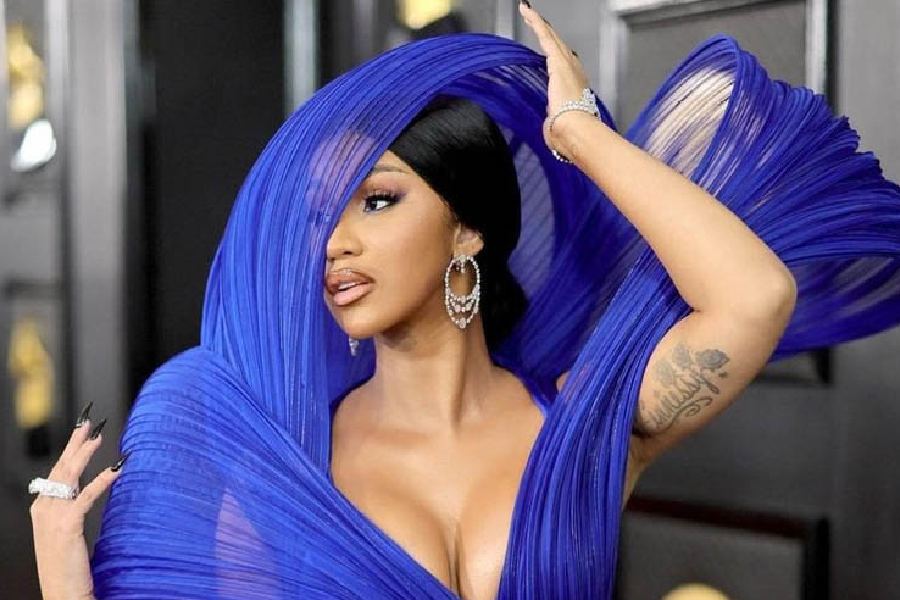Rapper Cardi B found herself embroiled in a sharp back-and-forth with a social media personality this week after he brought up her social class, upbringing and skin color. A quarrel soon erupted over colorism and questions of who gets to profit over which public affect.
Of course, Cardi B isn’t one to shrink from a fight, and it wasn’t even the first spat this year to involve a high-profile rapper. But the argument is notable for the difficult issues it broached having to do with colorism — the way prejudice can vary based on someone’s skin color, and how it can lead to stereotypes and differential policing of behavior.
Here’s what we know about the charged exchange.
What happened?
In a TikTok video posted Wednesday, social media personality Raymonte Cole lamented being labeled too “ghetto” to be marketable while someone like Cardi B is still able to claim social status and brand deals.
“What bothers me as a Black person, you guys say that I’m ghetto,” Cole said in the video, which he has since removed from his TikTok account. But Cardi B, he said, “is very, very ghetto. She’s way ghettoer than me.”
The rapper fired back on X, formerly Twitter, on Wednesday afternoon. “It’s crazy because when I became famous people said I’m ghetto,” she wrote.
“To this day no matter what I accomplished I still get called a stripper all because I’m from the ghetto,” she continued. “People misinterpret me because apparently I’m LOUD AND GHETTO.”
Did it get personal?
In his original video, Cole, who is known online simply as Raymonte, invoked colorism, claiming that Cardi B was perceived as being more “marketable” because she has lighter skin and isn’t subject to the same prejudices as darker-skinned people with similar upbringings.
Drawing a comparison between himself and Cardi B, Cole said that the rapper “doesn’t look like a visible Black woman to me.” “This is no shade, this is just literally a fact,” he said, “and we’re speaking on colorism and all those type of things.”
The two exchanged remarks in quoted messages Wednesday. In an interview Thursday, Cole reiterated that while he meant no offense to Cardi, he stood by his comment. “Girl why are you getting so mad at the comparison,” he wrote on X. “I’m saying you are successful and reached heights that visibly Black people ghetto people have a harder time reaching.”
Cardi B, whose representatives did not reply to requests for comment, responded by saying that reaching her current level of success required a great deal of code switching — altering the way she spoke and presented herself to suit her audience.
“I had to change the way I talk, the way I act and the way I respond and how I present myself,” she wrote. “You ignoring all of that and playing the color card.”
How is Essence magazine involved?
The online conversation about the hurdles and stereotypes faced by Black media personalities was a response to an article published on the Essence website that looked at a recent birthday trip he took with other Black influencers to make the point that brands chronically overlook Black influencers.
However, Cole felt it was hypocritical that the publication would use his birthday trip as an example of being overlooked in the media when it had treated him similarly.
“Omg essence thank you for the article but this is kind of hypocritical,” he wrote on X on Tuesday. “You all have invited numerous other influencers to events never me.”
Who is Raymonte?
Cole is a 24-year-old social media personality from Minneapolis who has more than 2 million followers on TikTok and 345,000 followers on Instagram. His posts mostly involve posed pictures of different looks and styles or videos of him approaching random people on the street.
In the interview, Cole tried to clarify his earlier remarks on TikTok. “Anyone can be ghetto,” he said. “It’s only bad when it’s with darker-skinned Black people or people that are visibly Black.”
Cole’s career as an influencer began in earnest after the death of his brother in 2021. He said one of his first TikTok videos, which showed a memorial for his brother held in their house, really resonated with users.
“It was a very happy outlet for me,” he said of the platform.
The New York Times News Service











